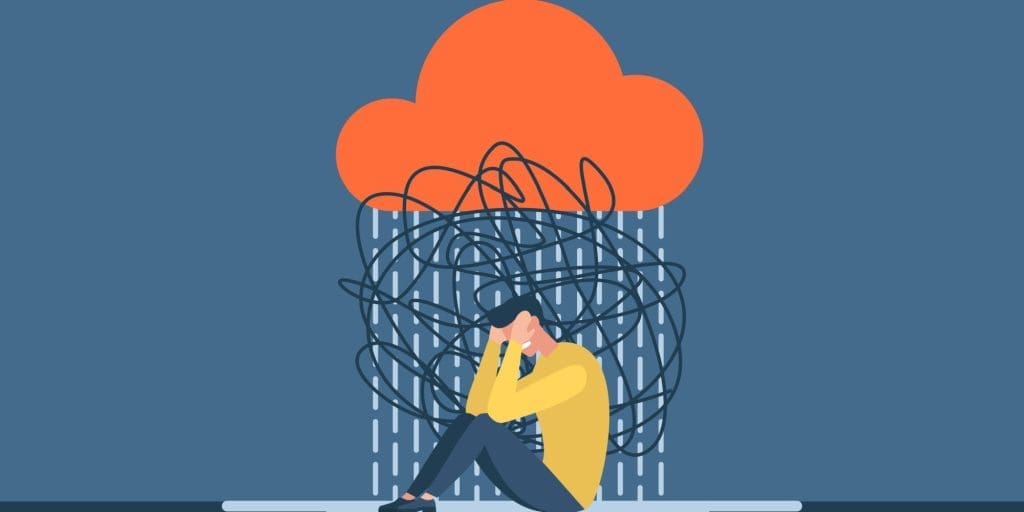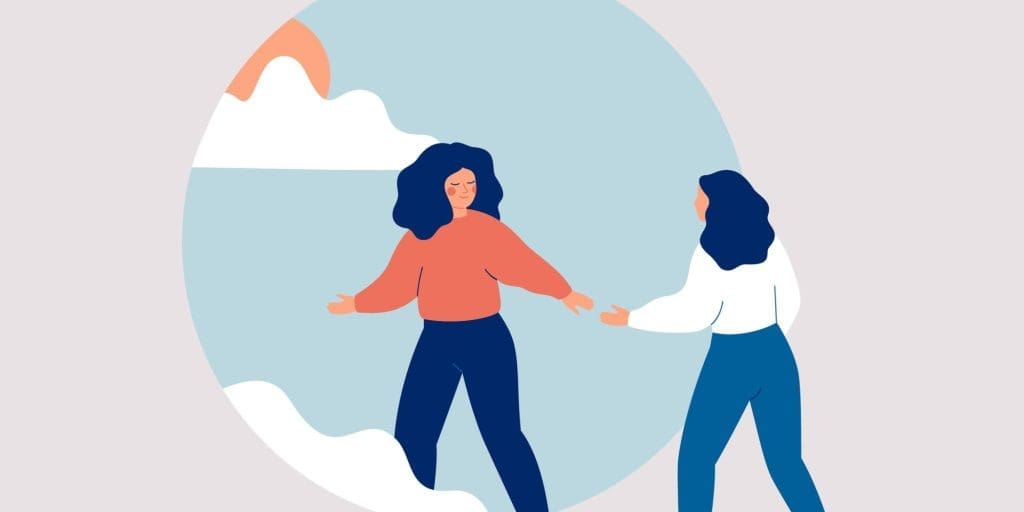Anxiety and depression are two serious mental health conditions that can impact your day-to-day life and persist if you don’t receive treatment. Despite the overlap when it comes to causes, symptoms, and treatments, it’s possible to have one of these conditions without the other. So how do you tell them apart? Below you’ll learn about the key differences between anxiety vs. depression and how you can get help if you’re struggling with your mental health.
Contents
What Is Anxiety?

The first step in identifying anxiety vs. depression is to take a deeper look into both of these issues. For our purposes, we’ll start with a brief overview of anxiety disorders.
Anxiety disorders are one of the most common mental health issues in the United States, with over 40 million adults estimated to be struggling with an anxiety disorder. People with anxiety experience excessive worry and consistent fear that something will go wrong. The distinct mental and physical symptoms of anxiety can help determine whether you have anxiety in addition to what type.
The different types of anxiety disorders include:
- Generalized anxiety disorder (GAD)
- Post-traumatic stress disorder (PTSD)
- Obsessive-compulsive disorder (OCD)
- Social anxiety disorders
- Panic disorders
- Agoraphobia
Signs and Symptoms of Anxiety
Mental signs and symptoms:
- Irritability
- Excessive fear and worry
- Rumination
- Fear of losing control
- Feelings of detachment
- Racing thoughts
- Difficulty concentrating
- Situation avoidance
- Hypervigilance
Physical signs and symptoms:
- Panic attacks
- Nausea
- Fatigue
- Sweating
- Muscle tension
- Chest pains
- Elevated heart rate
- Palpitations
- Tingling or numbness
- Digestive upset
What Is Depression?
Of course, to fully understand anxiety vs. depression, it’s vital to also understand how depressive disorders present themselves.
Major depressive disorder (MDD), or clinical depression, is not as common as anxiety. However, it still affects over 16 million adults in the United States. People with depression experience overwhelming feelings of sadness and hopelessness. When these symptoms go untreated, they can put individuals at risk of experiencing suicidal ideation. Similarly to anxiety, a mental health professional can diagnose you with depression according to your symptoms.
Types of depression include:
- Major depressive disorder (MDD)
- Persistent-depressive disorder
- Seasonal affective disorder (SAD)
- Postpartum depression
Signs and Symptoms of Depression
Mental signs and symptoms of depression:
- Irritability
- Difficulty concentrating
- Memory problems
- Feelings of guilt or worthlessness
- Feeling helpless or hopeless
- Loss of interest in hobbies
Physical signs and symptoms:
- Restlessness
- Moving or talking slowly
- Sleeping too much or too little
- Fatigue even with proper sleep
- Appetite changes
- Weight changes
- Digestive issues
Anxiety vs. Depression: What’s the Connection?
When comparing anxiety vs. depression, the list of symptoms can make it easy to spot the differences. However, triggers and the onset of both disorders is similar. This can make it more difficult to tell the disorders apart when you’re experiencing them together. Further, it puts adults with one disorder are at a higher risk of experiencing the other.
A major contributor to their similarities is the shared biological basis of anxiety vs. depression. For example, low serotonin levels are attributed to both disorders. These neurotransmitter levels are important when it comes to finding effective forms of medication, which is why anxiety and depression are often treated with the same medications.
In addition, genes and similar brain structures or processes can contribute to the development of both disorders. Various types of stress and trauma can also lead to depression and anxiety disorders.
Is It Possible to Have Anxiety and Depression at the Same Time?
In short, yes, it is possible to have both anxiety and depression. In addition to being two of the most commonly diagnosed mental health disorders, anxiety and depression can occur sequentially or as comorbidities. For example, you can experience feelings of hopelessness associated with depression after having an anxiety attack. In this situation, separating the two feelings into anxiety vs. depression may not be possible, since both disorders interact so heavily with each other.
However, seeking help can help you determine if you’re experiencing anxiety vs. depression or both. Figuring out the distinction is essential in receiving proper treatment for your mental health problems.
Medication for Anxiety vs. Depression
The types of medication most effective in treating anxiety vs. depression are similar but affect neurotransmitters in the brain differently. For instance, the most common types of medication used to treat both disorders are selective serotonin reuptake inhibitors (SSRIs) and serotonin-norepinephrine reuptake inhibitors (SNRIs).
Selective serotonin reuptake inhibitors (SSRIs), commonly known as antidepressants, slow down the reabsorption of serotonin in the nerve cells of the brain to regulate mood and feelings of anxiety. This process makes SSRIs a typical first choice when it comes to treating depression or generalized anxiety disorder. Additionally, selective serotonin reuptake inhibitors can take weeks to come into effect but are proven to minimize symptoms in most people who take them.
Another type of SSRI that is exclusively used as an anti-anxiety medication is benzodiazepines. Also referred to as benzos, this medication is used to treat short-term anxiety symptoms. It’s fast-acting but not intended for long-term usage because of the quick effects and risk of physical dependence.
Furthermore, serotonin-norepinephrine reuptake inhibitors (SNRIs) block the reabsorption of serotonin and norepinephrine in the brain. This type of medication can be used to treat anxiety disorders and depression. However, deciding which type of medication is best for you depends on which disorder you are treating, the severity of your symptoms, and potential side effects.
Treatments for Anxiety vs. Depression

Knowing when to seek help if you’re unsure whether you’re battling anxiety vs. depression (or both) is a difficult but necessary step in improving your mental health. Untreated mental and physical symptoms of anxiety and depression can have a detrimental effect on your daily life. Therefore you should seek help immediately if you experience new or worsening symptoms.
With that said, treatments for anxiety and depression are similar. Most treatment options are effective in treating both mental health conditions separately or together. The adult mental health program at Port St. Lucie Hospital offers evidence-based treatment modalities through the residential and partial hospitalization program (PHP). Choosing which program is right for you depends on the severity of your symptoms and the type of environment best suited for your recovery plan.
One such therapy method available through both programs is cognitive behavioral therapy (CBT). This is a form of individual talk therapy that focuses on identifying, challenging, and reframing negative thought patterns and behaviors. CBT can improve obsessive thought patterns including rumination. Support groups, group therapy, medication management, and supplemental therapies are also effective in making it easier to cope with the symptoms of these disorders long-term.
Get Help to Improve Your Mental Health Today
Feeling sad or anxious from time to time is normal, but when it interferes with your daily life, it’s time to seek help. Now that you know more about anxiety vs. depression, you should have a better idea of what type of mental health challenges you are facing.
Port St. Lucie Hospital provides the services necessary for treating anxiety and depression. Our treatment center provides a safe and supportive environment so you can regain control of your mental health. If you want to know more about how was can help you manage your anxiety or depression, call us at (772) 335-0400 or submit a confidential contact form online. With our help, you won’t struggle alone.


























